Abstract
This article builds upon more than 6 years of critical research in urban schools in northern California to offer a particular perspective on teaching for social justice. Concerned with prevailing issues in adolescent literacy, this article examines instantiations of literacy instruction in the shadow of the late activist poet June Jordan and with the support of Pulitzer Prize-winning author Alice Walker. It focuses on culturally responsive pedagogy to understand not only their work but also the work of teachers and other educators. Central to the discussion are two kinds of pedagogical innovations, one based on a school-community partnership and the other a district-wide sponsored writing contest. Implications for classroom practice and key lessons useful for teachers interested in similar work are also discussed.

Similar content being viewed by others
Notes
All names are pseudonyms, except for Alice Walker, June Jordan, and the University of California, Berkeley.
Special thanks to students, teachers, and administrators for assisting in the construction of this narrative.
Different from a haiku or a tanka, a t’ang poem consists of four lines with five one-syllable words per line, each word either a verb or a noun.
References
Ayers, W. (Ed.). (1998). Teaching for social justice: A democracy and education reader. New York: New Press.
Au, K., & Jordan, C. (1981). Teaching reading to Hawaiian children: Finding a culturally appropriate solution. In H. Trueba, B. Guthrie & K. Au (Eds.), Culture and bilingual classroom: Studies in classroom ethnography (pp. 139–152). Rowley, MA: Newbury.
Banks, J., & Banks, C. (Eds.). (1995). Handbook of research on multicultural education. New York: Macmillan.
Cammarota, J. (2007). A social justice approach to achievement: Guiding Latina/o students toward educational attainment with a challenging, socially relevant curriculum. Equity and Excellence in Education, 40, 87–96.
Cazden, C., & Leggett, E. (1981). Culturally responsive education: Recommendations for achieving Lau remedies II. In H. Trueba, G. Guthrie & K. Au (Eds.), Culture and the bilingual classroom: Studies in classroom ethnography (pp. 69–86). Rowley, MA: Newbury.
Erickson, F., & Mohatt, G. (1982). Cultural organization and participant structures in two classroom of Indian students. In G. Spindler (Ed.), Doing ethnography of schooling (pp. 131–174). New York: Holt, Rinehart & Winston.
Gay, G. (2000). Culturally responsive teaching: Theory, research and practice. New York: Teachers College.
Heath, S. B. (1982). What no bedtime story means: Narrative skills at home and at school. Language in Society, 11(2), 49–76.
International Reading Association/National Council of Teachers of English. (1996). Standards for the English language arts. Urbana, IL: National Council of Teachers of English.
Irvine, J. (1990). Black students and school failure. Wesport, CT: Greenwood.
Jocson, K. M. (2005). “Taking it to the mic”: Pedagogy of June Jordan’s Poetry for the People and partnership with an urban high school. English Education, 37(2), 44–60.
Jocson, K. M. (2006). “The best of both worlds”: Youth poetry as social critique and form of empowerment. In S. Ginwright, J. Cammarota & P. Noguera (Eds.), Beyond resistance! youth activism and community change: New democratic possibilities for practice and policy for America’s Youth (pp. 129–147). New York: Routledge.
Jocson, K. M., Burnside, S., & Collins, M. (2006). Pens on the prize: Linking school and community through contest-inspired literacy. Multicultural Education, 14(2), 28–33.
Jordan, J. (1998). Affirmative acts: Political essays. New York: Anchor/Doubleday.
Jordan, J. (2002). Introduction. In Poetry for the People (Ed.), Speak on it! Smash the State: The second coming. Berkeley, CA: Poetry for the People.
Kumashiro, K. (Ed.). (2001). Troubling intersections of race and sexuality: Queer students of color and anti-oppressive education. Lanham, MD: Rowman and Littlefield.
Ladson-Billings, G. (1994). The dreamkeepers: Successful teachers of African American children. San Francisco: Jossey-Bass.
Kincheloe, J., & McLaren, P. (1998). Rethinking critical theory and qualitative research. In N. K. Denzin & Y. Lincoln (Eds.), The landscape of qualitative research: Theories and issues (pp. 130–155). Thousand Oaks, CA: Sage.
Moje, E. (2007). Developing socially just subject-matter instruction: A review of the literature on disciplinary literacy teaching. Review of Research in Education, 31, 1–44.
Moje, E., & Hinchman, K. (2004). Culturally responsive practices for youth literacy learning. In T. Jetton & A. Dole (Eds.), Adolescent literacy research and practice (pp. 321–350). New York: Guilford.
Moll, L., & Gonzalez, N. (1994). Lessons from research with language-minority Children. Journal of Reading Behavior, 26(4), 439–456.
Muller, L., & the Poetry for the People Blueprint Collective. (Eds.). (1995). June Jordan’s poetry for the people: A revolutionary blueprint. New York: Routledge.
New London Group. (1996). A pedagogy of multiliteracies: Designing social futures. Harvard Educational Review, 66(1), 60–92.
Nieto, S. (2000). Affirming diversity: The sociopolitical context of multicultural education (3rd ed.). New York: Longman.
Sablo Sutton, S. (2003). Writing our selves: An investigation of literacy, identity and poetry in an urban high school. Unpublished dissertation, University of California, Berkeley.
Stovall, D. (2006). Urban poetics: Poetry, social justice and critical pedagogy in education. Urban Review, 38(1), 63–80.
Street, B. (1984). Literacy in theory and practice. Cambridge, UK: Cambridge University Press.
Walker, A. (1982). The color purple. Orlando, FL: Harcourt/Harvest.
Author information
Authors and Affiliations
Corresponding author
Rights and permissions
About this article
Cite this article
Jocson, K.M. Steering Legacies: Pedagogy, Literacy, and Social Justice in Schools. Urban Rev 41, 269–285 (2009). https://doi.org/10.1007/s11256-008-0103-0
Published:
Issue Date:
DOI: https://doi.org/10.1007/s11256-008-0103-0




